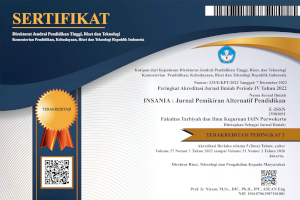Pengaruh Ekstrakurikuler dan Motivasi Belajar terhadap Hasil Pembelajaran Mahasiswa STIE AAS Surakarta
DOI:
https://doi.org/10.24090/insania.v26i1.4811Keywords:
English Fun Club, motivation, learning outcomesAbstract
The research aims to analyze the influence of English Fun Club extracurricular and learning motivation on the learning outcomes of Bahasa Inggris 2 subject of STIE AAS Surakarta students. It is assumed that the significant different in the students daily scores and semester scores is influenced by these two variables. This research is a quantitative approach using population study or census. The population of this research is the fourth semester students of STIE AAS Surakarta who take part in the English Fun Club activities, totaling 67 people in the odd semester of the 2020/2021 academic year and all of them are taken as research subjects. The data collection techniques using documentation and questionnaires. The instrument validity is tested using Product Moment and the reliability is tested using Cronbach Alpha. The data is analyzed using multiple linear regress analysis. Based on the interpretation of correlation coefficient and tested using product moment correlation formula, the results is 0.693 which proves that extracurricular activities have positive influence on learning outcomes. While the results of the partial calculation of the influence of learning motivation on the learning outcomes with regression coefficient value (b) 0.663, at a significance level of 5%, the tcount is 9.984 with a significance value of 0.000. The regression coefficient has positive value and a significance value (p) <0.05, it can be concluded that there is positive influence of learning motivation on English learning outcomes for STIE AAS Surakarta students.Downloads
References
Prihatin, E. (2012). Manajemen Peserta Didik. Alfabeta.
Kemendikbud. (2013). Kementrian Pendidikan dan Kebudayaan tahun 2013 tentang kriteria Hasil Belajar. Kemendikbud.
Kompri. (2016). Motivasi Pembelajaran Perspektif Guru dan Siswa. PT Remaja Rosdakarya Offset.
S. Margono. (2004). Metode Penelitian Pendidikan. PT. Rineka Cipta.
Fischer, N., Radisch, F., & Schüpbach, M. (2014). International perspectives on extracurricular activities: Conditions of effects on student development, communities and schools. Journal for educational research online.
Nyanyu, K. (2014). Psikologi Pendidikan. Jakarta: Rajawali Pers.
Purnamasari. (2015). Panduan Menyusun Sop Standard Operating Procedure. Kobis.
Sanjaya, W. (2008). Strategi Pembelajaran Berorientasi Standar Proses Pendidikan. Kencana Prenada Media Group.
Sardiman. (2012). Interaksi dan Motivasi Belajar Mengajar. Raja Grafindo Persada.
Sedarmayanti. (2009). umber Daya Manusia dan Produktivitas. Penerbit Mandar Maju.
Sulistiyani. (2003). Menejemen Sumber Daya Manusia. Bumi Aksara.
Suryosubroto. (2009). Proses Belajar Mengajar di Sekolah. Rhineka Cipta.
Uno, H. (2013). Teori Motivasi dan Pengukurannya. Bumi Aksara.
Wiyani, N. A. (2013). Manajemen Kelas. Ar-Ruzz Media.
Downloads
Published
How to Cite
Issue
Section
License
Authors who publish with this journal agree to the following terms:
Authors retain copyright and grant the journal right of first publication with the work simultaneously licensed under a Creative CommonsAttribution-ShareAlike License that allows others to share the work with an acknowledgment of the work's authorship and initial publication in this journal.
Authors are able to enter into separate, additional contractual arrangements for the non-exclusive distribution of the journal's published version of the work (e.g., post it to an institutional repository or publish it in a book), with an acknowledgment of its initial publication in this journal.
Authors are permitted and encouraged to post their work online (e.g., in institutional repositories or on their website) prior to and during the submission process, as it can lead to productive exchanges, as well as earlier and greater citation of published work (See The Effect of Open Access).









